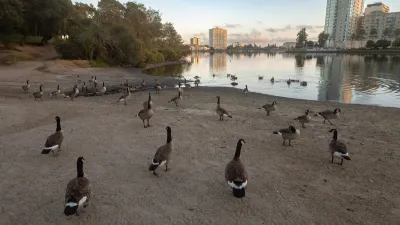Efforts to desegregate schools in the 1970s weakened neighborhood ties. Now, a return to school assignments based on where children live could make communities stronger.
Back in the day, local public schools defined the city of Seattle, says essayist Knute Berger, who writes, "The first question Seattleites used to ask each other was "Where did you go to school?" They'd answer Franklin, Garfield, Rainier Beach, Ballard, Roosevelt, Lincoln, Queen Anne. It was short-hand for telling them all about yourself...it was the starting point for establishing common ground."
Berger contends mandatory busing policies changed that social fabric. While many cities, including Seattle, have dropped busing polices, now is the time to re-establish schools as neighborhood hubs.
Converting school assignment policies to place students in neighborhood schools eliminates choice, a bad thing for families who want to give their children the best education options possible. Berger says to make a neighborhood schools strategy work, safety issues need to be addressed, affordable housing needs to be made available within walking distance of schools, and streets must be made bike and pedestrian friendly.
These tactics are hallmarks of neighborhood sustainability efforts. By making neighborhood schools better places, cities are improved for all citizens.
FULL STORY: How schools can help save neighborhoods

Alabama: Trump Terminates Settlements for Black Communities Harmed By Raw Sewage
Trump deemed the landmark civil rights agreement “illegal DEI and environmental justice policy.”

Study: Maui’s Plan to Convert Vacation Rentals to Long-Term Housing Could Cause Nearly $1 Billion Economic Loss
The plan would reduce visitor accommodation by 25% resulting in 1,900 jobs lost.

Planetizen Federal Action Tracker
A weekly monitor of how Trump’s orders and actions are impacting planners and planning in America.

Wind Energy on the Rise Despite Federal Policy Reversal
The Trump administration is revoking federal support for renewable energy, but demand for new projects continues unabated.

Passengers Flock to Caltrain After Electrification
The new electric trains are running faster and more reliably, leading to strong ridership growth on the Bay Area rail system.

Texas Churches Rally Behind ‘Yes in God’s Back Yard’ Legislation
Religious leaders want the state to reduce zoning regulations to streamline leasing church-owned land to housing developers.
Urban Design for Planners 1: Software Tools
This six-course series explores essential urban design concepts using open source software and equips planners with the tools they need to participate fully in the urban design process.
Planning for Universal Design
Learn the tools for implementing Universal Design in planning regulations.
Caltrans
Smith Gee Studio
Institute for Housing and Urban Development Studies (IHS)
City of Grandview
Harvard GSD Executive Education
Toledo-Lucas County Plan Commissions
Salt Lake City
NYU Wagner Graduate School of Public Service




























